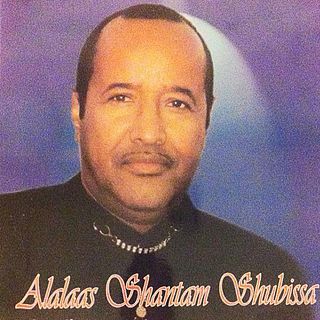Top Qs
Timeline
Chat
Perspective
Shantam Shubissa
Ethiopian singer and composer From Wikipedia, the free encyclopedia
Remove ads
Shantam Shubisa (born Mohamed Ibrahim Waday; 25 December 1949) is an Ethiopian composer, singer and poet.[1] He was born in Dire Dawa, Ethiopia. Along with musicians such as Ali Birra, Shantam Shubissa is regarded as one of Oromian significant contributors to music during the late 20th century [2]
Remove ads
His stage name "Shantam" means "fifty". It was given after Shantam released a song where he composed the same chorus in five different languages: Arabic, Oromo, Somali, Amharic and Harari.[3] The word Shan is "five" morphed into Shantam to fifty. The surname Shubissa is derived from the word Shuba which means to dance Shubissa meaning dancer and was added Together, his name is translated as "fifty the dancer.
Remove ads
Musical career
Shantam released many songs ranging from a variety of topics including love, nature and revolutionary politics. Although he has not released an official collection of poetry, his most famed classic songs[4] include: "Alaaba Nagayaa", (Banner of Peace), "Naaf si uume" (You were created for me), "Yaa Quburee" (Hey Gorgeous), and "Yaa haadha too" (My mother).[2]
Awards
In 1995, Shantam was awarded for his contributions by the Oromo Radio Committee in Melbourne, Australia.[5] He also received recognition for contribution to language and culture,[6] a lifetime contribution to music and arts award in Melbourne, Australia; 2000[citation needed] and was officially invited back to Africa, [where?] after decades in exile.,[2] as a special guest to open the Oromo Cultural Centre in Adama, Oromia in 2006. Shantam also toured United States, Canada and Germany numerous times, singing to Oromo people living outside his native country.[7]
Remove ads
References
Wikiwand - on
Seamless Wikipedia browsing. On steroids.
Remove ads

